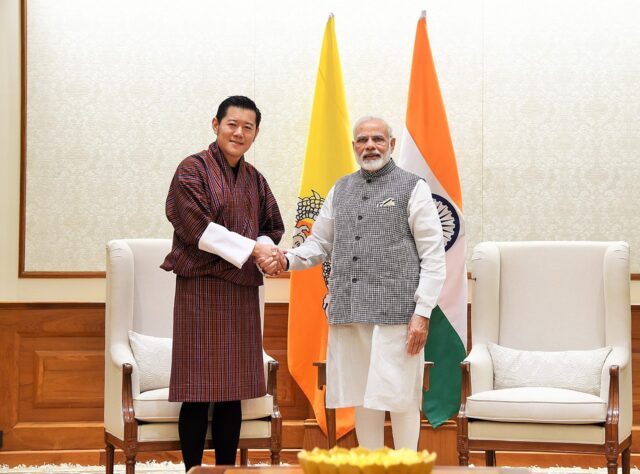India and Bhutan initiated their diplomatic relationship in 1968, with the establishment of Special Office of India in Thimpu, which was converted into full-fledged embassy in 1978. Both the countries have shared a strong bond with each other on the basis of Indo- Bhutan Treaty of Peace and Friendship, which was signed 1949, and later revised in 2007. This treaty provides for, among other things, perpetual peace and friendship, free trade and commerce and equal justice to each other’s citizens. In the year 2007 when the treaty was re-negotiated, provisions were included to encourage Bhutan’s sovereignty, abolishing the need to take India’s guidance on foreign policy. Also, the updated treaty, besides providing close cooperation on national issues, provides for stronger cooperation in cultural and economic fields.
The strong bond between India and Bhutan has developed due to the nurturing of relationship by leaders from both sides of the border. There have been regular high level visits between the two countries. Even Prime Minister Narendra Modi chose Bhutan as the first country for his first official foreign tour as the Prime Minister of India. This shows how both countries see each other as excellent neighbours. Narendra Modi’s ‘Neighbourhood First’ policy has brought the countries closer. Both the countries share forums like, South Asian Association for Regional Cooperation (SAARC), Bay of Bengal Initiative for Multi-sectoral Technical and Economic Cooperation (BIMSTEC) etc.
The relationship between the two countries is based on mutual trust, respect; and shared historical, cultural, economic and people-to-people linkages. The ties are cordial and trouble-free, though both the countries share 699 kilometres long boundary. The King of Bhutan conferred Bhutan’s highest civilian decoration, Order of the Druk Gyalpo, on Prime Minister Narendra Modi. India and Bhutan are different from each other in various ways; India was a colonised country, under the British, but Bhutan was never under foreign rule. India fought for its independence and the freedom struggle brought in a transition for India, turning the country into a Parliamentary democracy. Bhutanese monarchy was initiated in 1907 on the basis of written contract and popular consent. Bhutan’s transition to democracy in 2007 was a smooth one, where the monarchy itself turned Bhutan into a democratic constitutional democracy. It has a unitary Parliamentary system. India is a large country, while Bhutan is a small country, geographically and population-wise.
Each country has given due attention to the friendship ties between themselves. India has been Bhutan’s largest trading partner and has invested in hydro-electric projects in Bhutan, like, Chukha, Kurichhu, Tala etc. India’s Vaccine Maitri Initiative saw Bhutan as the first country to receive Covishield vaccines. In the premier institutes like the Indian Institute of Technology, Bhutanese youth are receiving regular placement. The e-library project has provided democratization of education where students from both sides of the border have benefitted. Several Indian scholarships are available to Bhutanese students, including the Nehru-Wangchuck Scholarship, ICCR Undergraduate Engineering Scholarship, AYUSH (BIMSTEC) Scholarship etc. Sherubtse College, situated in the east of Bhutan has developed after its close relationship with the Delhi University.
India has always extended its friendly arms to Bhutan. India Bhutan Foundation has been deposited with 8 crores by both the governments of Bhutan and India as a corpus fund, and is kept at a fixed deposit in Bhutan. India supports Bhutanese security; the Indian Military Training Team provides training to security forces of Bhutan, the Indian Army also supports Bhutan in anti-terrorism and counter-insurgency. Bhutan does not have a navy or an air force, the Eastern Air Command of the Indian Air Force provides the responsibility of protection. Bhutanese people visit Buddhist shrines in Nalanda, Bodh Gaya, Rajgir, Udaygiri, Sikkim and other places. Indian tourists visit places like Thimpu, Paro, Punakha etc. In order to commemorate the birth anniversary of Guru Padmasambhava, the Government of India gifted a bronze statue of Lord Buddha, and it is consecrated in Tashichodzong. India sponsored 18 monks of Bhutan and representative of Central Monastic body in order to celebrate the 50th anniversary of diplomatic relations between India and Bhutan.
Even after the pandemic, revenue from hydro-electric power has boosted by 10 per cent in 2020. During covid times, India has opened a new route through Ahlay, for ensuring trade and connectivity with Bhutan. India has provided covid testing kits and medicines. Many businesses in West Bengal, rely on hydro-electricity exported from Bhutan. Bhutan also has an important role in India’s Siliguri Corridor. Around 60,000 Indian nationals reside in Bhutan and are engaged in hydro electric power generation and road construction. India-Bhutan satellite is due to be launched very soon.
Bhutan’s strategic relationship has received greater importance and Indo-Bhutan relationship can be considered as one of the most cordial bilateral relationships in South Asia. The Gross National Happiness in Bhutan is given a lot of importance. A commission has been created as an institution to look into the creation of environment for Bhutanese to be happy. India’s support in the development growth of Bhutan based on gross national happiness is significant. India is sensitive to requirements of Bhutan, both the nations, cooperate on hydro-electric power, artificial intelligence, information technology, disaster management etc. Most important exports from India to Bhutan are mineral resources, machines, electrical equipments, vegetable products, etc. Major exports from Bhutan are electricity, ferro-silicon, portland cement, dolomite, timber, potatoes, cardamom etc. Being a landlocked country, Bhutan’s third country exports pass through Indian ports.
Conclusion
Both India and Bhutan have been affable and supported each other in the time of need. India believes that Bhutan is an important factor in its ‘Himalayan frontier’ security policy. Among all the neighbours in the region, India has the most cordial relationship with Bhutan and ‘Bharat to Bhutan’ vision has explored new areas of diplomatic ties between India and Bhutan.









